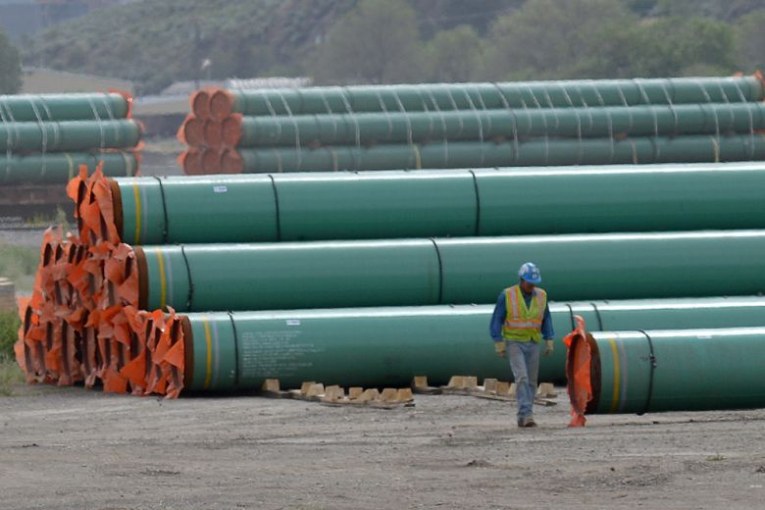
CALGARY — A liquefied natural gas export project backed by a Canadian company on the U.S. West Coast secured its final federal permits, but analysts say the proposed project still faces tremendous uncertainty.
U.S. Energy Secretary Dan Brouillette issued Monday the final order authorizing export of LNG from Calgary-based Pembina Pipeline Corp.’s Jordan Cove LNG in Oregon. The Federal Energy Regulatory Commission had approved the project and authorized construction of the terminal and connected pipeline in March.
“Today’s authorization for Jordan Cove, the first U.S. West Coast LNG project, will ease access to further position the U.S. as a top supplier of LNG around the world,” Brouillette said in a release.
You could have all the approvals you want, but it doesn’t mean anything until it’s built and flowing volumes
Raymond James analyst Jeremy McCrea
The approval came after a number of rejections by U.S. regulators over the years, and the project remains contentious in the local community. The proposed US$10 billion project still requires state-level approvals, which suggests Pembina could continue to encounter opposition to the project in the state.
“Pembina is pleased with the issuance order by the DOE, which marks another momentous step forward for Jordan Cove,” the company said, if built, in an emailed statement, adding the terminal would export natural gas from both Canada and the U.S.
Sourcing the commodity from the Malin gas trading hub near the California/Oregon border would create “a new outlet for natural gas from areas such as the Rockies Basin,” Pembina said.
The company declined to provide a timeline for construction of the project, but has previously delayed an expected final investment decision for the project after regulatory setbacks. Pembina’s stock price fell 1.3 per cent to close at $32.45 on Toronto in a broadly negative market.
The energy secretary’s final order is a positive signal for the Canadian natural gas industry but “nothing is ever a sure thing now,” Raymond James analyst Jeremy McCrea said Tuesday.
“You could have all the approvals you want, but it doesn’t mean anything until it’s built and flowing volumes,” McCrea said, adding that he didn’t know what additional legal challenges the Jordan Cove LNG project could yet face.
On Monday, court decisions in the U.S. dealt setbacks to the Keystone XL pipeline project, which is under construction, and the Dakota Access Pipeline, which has been operating for years, but is now required to shut down by Aug. 5.
“Today is a historic day for the Standing Rock Sioux Tribe and the many people who have supported us in the fight against the pipeline,” said Chairman Mike Faith of the Standing Rock Sioux Tribe, which led protests and legal efforts against the Dakota Access Pipeline. “This pipeline should have never been built here. We told them that from the beginning.”
McCrea said the legal challenges facing energy infrastructure projects make it difficult for oil and gas companies to celebrate approvals of projects such as Jordan Cove LNG. He also said the approvals come as the international market for LNG has deteriorated.
Data from ATB Capital Markets Research showed that LNG prices in Japan stood at US$2.15 per thousand cubic feet on Monday, compared to US$1.46 per mcf price in Alberta but not high enough to justify the cost to ship gas to a terminal, liquefy it and then transport the LNG across the Pacific to Asian markets.
“Given a glut of LNG in the face of challenged demand with COVID-19, European and Asian prices have collapsed to U.S. levels, driving out the incentive for U.S. LNG imports,” Eight Capital analysts wrote in a June 24 research note. They noted that U.S. LNG cargoes had fallen by 4.7 billion cubic feet per day compared with the first quarter of the year.
The analysts predicted that natural gas prices would eventually pick up at the end of the year when winter begins and consumers begin to draw on gas supplies to heat their homes.
The U.S. midstream gas industry also got a big boost this week when the world’s most well-known countercyclical investor Warren Buffett’s Berkshire Hathaway Inc. announced a US$10-billion acquisition of Virginia-based Dominion Energy Inc.
Over the weekend, Dominion and its joint venture partner Duke Energy Corp. had said they will scrap their US$8 billion Atlantic Coast natural gas pipeline after years of delays and high costs, in what was seen as a major victory for environmental groups.
Citi Research analyst Ryan Levine called Buffett’s deal a “shot of adrenaline” into the midstream space and noted that Dominion’s asset portfolio included “FERC-regulated long-haul pipelines, gas storage and long-haul contracted LNG project with no growth in the Northeast U.S.”
• Email:
You can read more of the news on source
